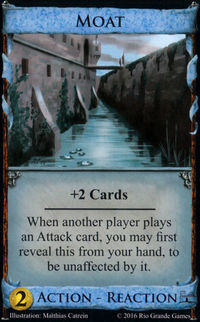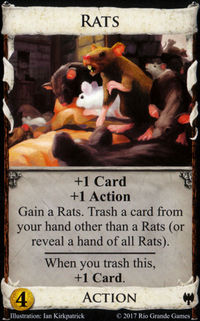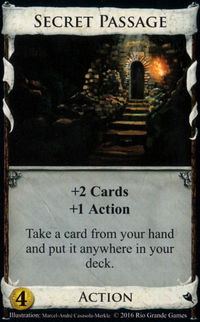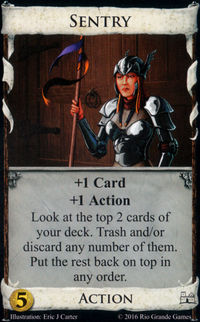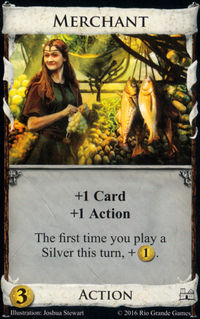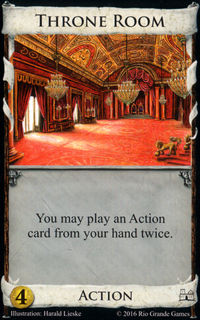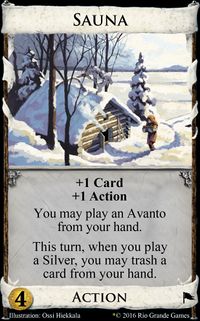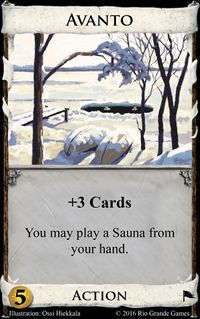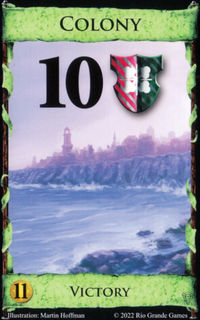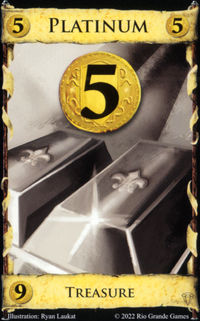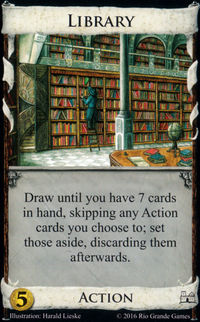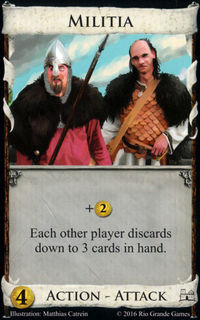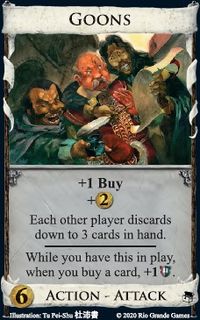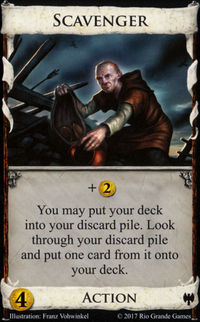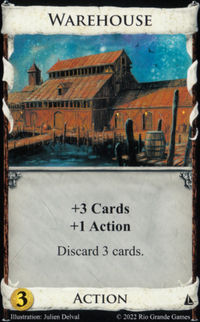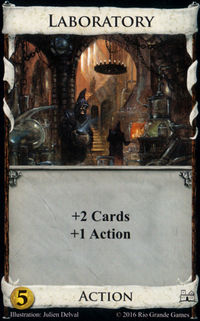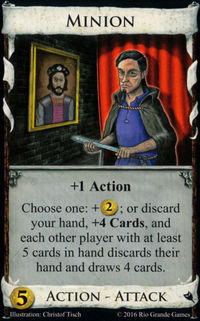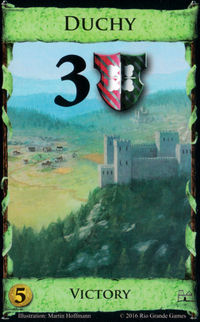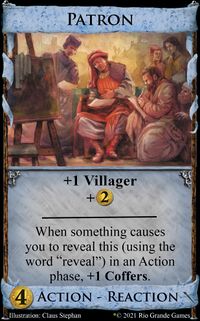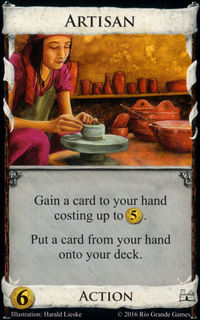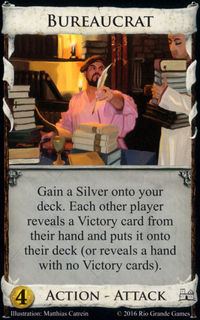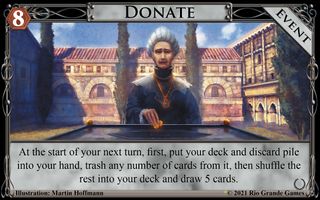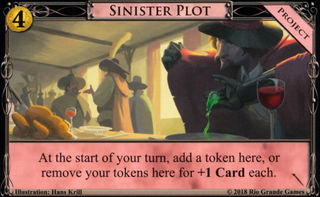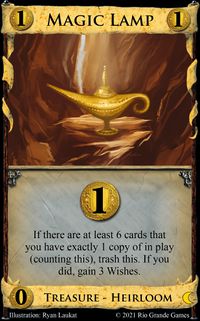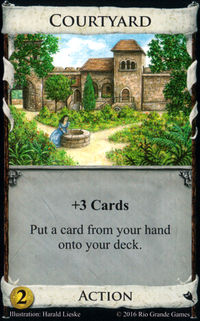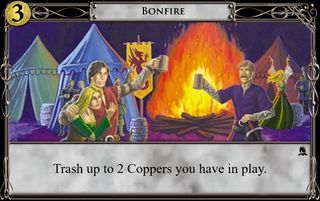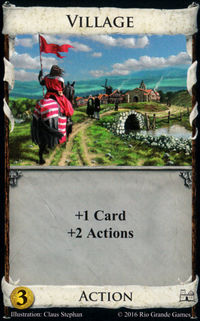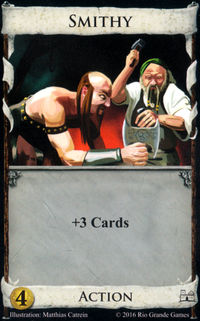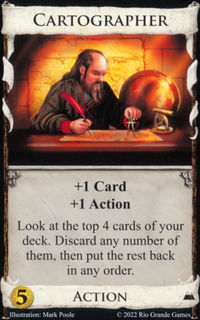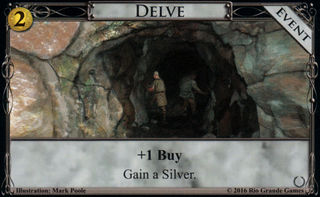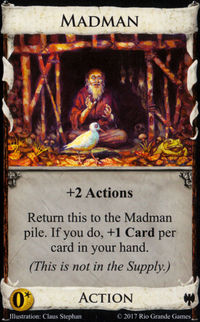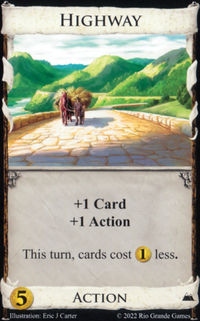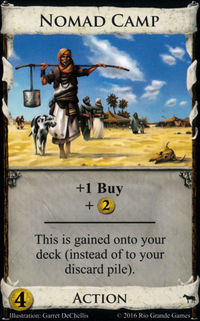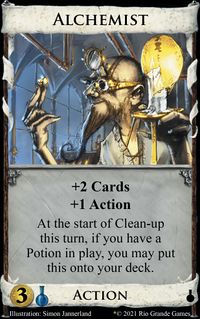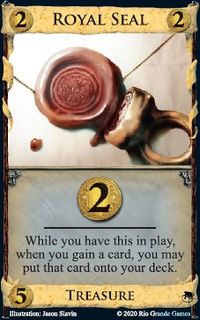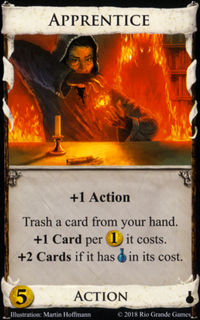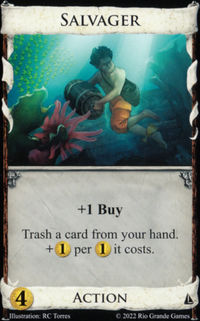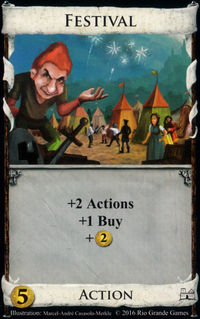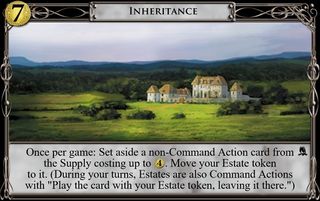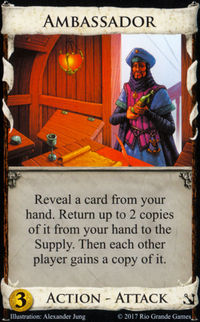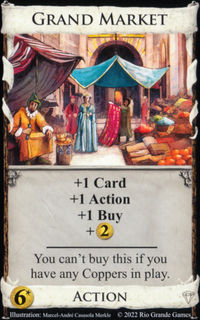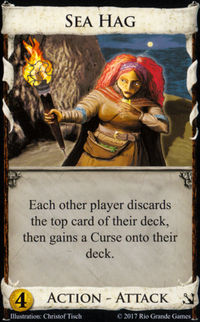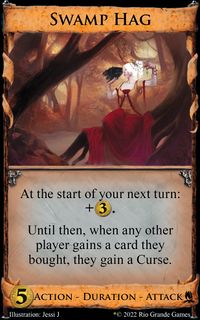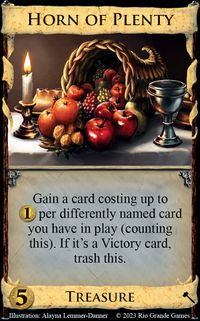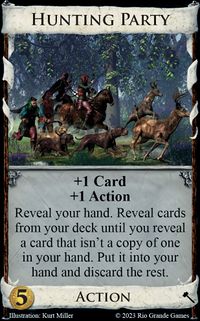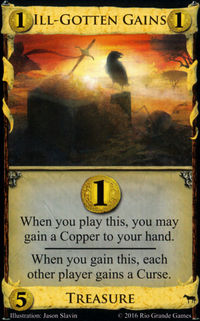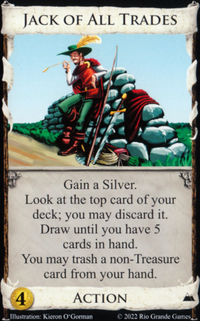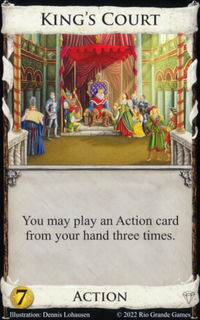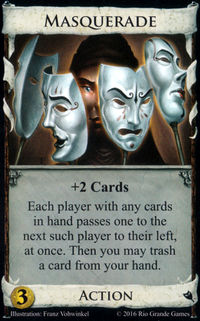Glossary
From DominionStrategy Wiki
(Redirected from Deck tracking)
This page contains a list of common terms and abbreviations used in discussion of the game Dominion.
Contents |
Common terms and phrases
A
- Attack immunity: Abilities that prevent a player from being affected by Attack cards (e.g. Moat).
- Autopile: To empty a pile by playing cards from that pile, e.g. with Rats.
B
- Base: The original Dominion, with no expansions. For example, “In Base, Chapel is the best early-game trasher.”
- Big Money: see Money Strategies
- Board (or Kingdom, or set): The set of cards and landscapes that make up a particular game.
- Build: To improve the quality of one’s deck, usually by adding deck control or payload
- Bottomdeck: To appear, or to place a card, at or near the bottom of your deck, often so that you can’t draw it immediately—either deliberately, as with Secret Passage, or randomly as a result of shuffling. Most commonly used to describe an undesirable case, e.g. "I hope I haven't bottomdecked my Sentry."
C
- Cantrip: Any card that gives +1 Card, +1 Action; it costs no net Action to play it and your hand size does not change. Can technically refer to villages, but in practice usually refers to cards like Merchant.
- Card-shaped thing: a card, or another gameplay element printed on a physical card, such as a Way, Event, Landmark, or Project.
- Centralizing (adj.): A card is said to be centralizing if it is an important component of the most effective strategy in a given Kingdom, so that gaining it is effectively mandatory. E.g., "Recruiter is often centralizing in Kingdoms in which it appears."
- Chain: To play a card while another card is resolving. Common examples include Throne Room chains in which successive Throne Rooms are played on each other, or Sauna/Avanto chains.
- Coffers: A token a player gets when cards say "+1 Coffers" (or, in early printings of Dominion: Guilds, "take a Coin token") and that they keep on their Coffers mat (or the Coffers side of their Coffers/Villagers mat), to save for later; each token can be removed from the mat at some later point for +.
- Collision: Having two or more given cards together in the same hand.
- Colony game: Any game in which Colony and Platinum (from Prosperity) are available in the supply. The two always appear together.
- Combo: A strong interaction between cards that is a monolithic strategy.
- Counter: To neutralize or mitigate another effect (usually an Attack card or strong but fragile strategy, e.g. Counting House/Travelling Fair), whether directly (e.g. Moat) or indirectly (e.g. Library vs. Militia/Goons).
- Cycling: To move through your deck and get closer to your next reshuffle, whether or not you draw or play the cards cycled through. Scavenger provides an extreme example of cycling, but Warehouse and Laboratory also cycle your deck effectively.
D
- Deck tracking: The ability of a player to know or estimate the contents and shuffle state of their and/or their opponent's decks at any given moment.
- Draw dead: To draw an Action card when you have no more Actions allowing you to play it.
- Draw to X (or DTX): A card ability that causes you to draw until you have a specified number of cards in your hard, such as those of Library or Minion, or a strategy centered around such cards.
- Duchy dancing: A situation in the endgame in which taking Provinces would risk opening up a win for one’s opponent, and therefore both players buy Duchies even when they could afford Provinces.
- Dud: A turn which falls significantly below your expectations, usually one in which a poor starting hand means you fail to draw much or any of your deck, or you fail to hit a desired pricepoint.
E
- Early game: The first few turns (usually up to around turn 6) of the game. Includes the opening.
- Endgame (or late game): The last few turns of the game, when greening and pileouts become a concern.
- End on piles: Force the game to end by emptying three or more Supply piles (four or more with five or more players). Also known as a Three-pile ending or a pileout.
- Engine: A strategy in which you play multiple Action cards every turn, usually aiming to draw your full deck after thinning your starting cards, and to build to a point at which you can buy multiple Provinces per turn or score more
 by other means; also such a deck itself. Compare with money strategies.
by other means; also such a deck itself. Compare with money strategies.
- Expansions: Releases of Dominion card sets beyond the Base set.
G
- Gain-and-play: To gain a card and play it within the same turn.
- Goko: The second major online implementation of Dominion. Operated from 2013 to 2015.
- Golden sombrero: When both cards bought in the opening miss the first reshuffle and are therefore not drawn until turn 5.
- Greening: The stage of the game in which players acquire Victory cards.
H
- Hand size: The number of cards in your hand.
I
- Isotropic (or Iso): http://dominion.isotropic.org — the first popular online implementation of Dominion, often linked to from the DominionStrategy forums. Operated from 2010 to 2013.
M
- Making Fun: The third major online implementation of Dominion. Operated from 2015 to 2016.
- Megaturn: A turn in which a player gains a large amount of
 , usually while also ending the game.
, usually while also ending the game.
- Midgame: The stage of the game after the opening and before the endgame, in which players begin to have deck control and can build without much fear of the game ending immediately.
- Mill (verb): To lower the amount of cards left in a pile without changing one's own deck state, usually by trashing a copy of that card and gaining another copy of it. Typically done on Provinces with a trash for benefit card as a tool for accelerating endgame when one is in the lead.
- Miss the reshuffle: For a card to be in a player's hand or play area when they reshuffle, and return to the discard pile afterward, meaning it will not be drawn again until after the next reshuffle.
- Mirror: When two or more players pursue identical or near-identical strategies.
- Multiplayer: A game with 3 or more players.
N
- Non-terminal: Any Action card that gives at least one additional action (+1 Action), or otherwise allows playing additional actions (e.g. Throne Room or Patron).
- The Nothing Test: A comparison between buying/gaining a card over buying/gaining nothing, often used to refer to a card being worse than nothing. E.g., "With , all I can buy is Silver, Estate, Copper, and Curse. None of these pass the Nothing Test here, as I have an unreliable draw-to-X deck that chokes on Treasures, and don't need the economy, so Silver and Copper are just junk to me. I also do not need to score, and there's no pileout with any of these piles, so buying Estate or Curse is also worse than nothing." See also: Silver test.
O
- Opening: The first two turns and purchases made then. Usually classified as a / or / opening, although other openings are possible with cards from expansions.
- Overdraw: The ability to draw more cards than your deck contains.
- Overterminal: To add more terminal Action cards to your deck than your terminal space can support.
P
- Piles: The stacks of cards from which players gain cards (or otherwise acquire them, e.g. by exchanging): for example “the Province pile has 3 remaining”.
- Pile control (a.k.a. pile pressure): The ability to empty piles for a three-pile ending at will. Usually described in relative terms, e.g. "I have more pile control than my opponent, given I have an extra Artisan they do not".
- Piledrive: To gain all the cards in a supply pile; especially, to do so rapidly or on a single turn.
- Pin: A very rare situation in which a player is unable to make any forward progress. Examples of cards that can lead to a pin include Bureaucrat and Donate.
- Pop: To get a powerful one-off effect that takes time or effort to build up to. Example uses include: "I'm going to pop my Sinister Plot next turn" and "My opponent is behind because they still haven't popped their Magic Lamp".
- Price point: A specific amount you are trying to generate in order to afford something. Example uses include: "Courtyard can help me control what price points I hit in the early game" and "One problem with a Bonfire opening is potentially missing higher price points on turns 3 and 4".
R
- Reshuffle: When a player turns over their discard pile and shuffles it to replace their empty deck.
- Rush: A strategy which attempts to end the game as quickly as possible, typically with a three-pile ending.
S
- Shuffle (noun): The content and ordering of cards in a player's draw pile between consecutive reshuffles. Example uses: "I triggered a shuffle with mostly junk" and "I hope my Villages and Smithies collide this shuffle".
- Shuffle iT: The fourth (and current) major online implementation of Dominion. Operating from 2017 to present day. Can be found at: https://dominion.games/
- Sift: To filter through your cards so that desired cards end up in your hand while undesirable cards are discarded, usually through draw-and-discard (e.g. Warehouse) or deck inspection (e.g. Cartographer) methods.
- Silver flooding: A technique usually associated with money strategies which aims to fill a deck with many Silvers (e.g., via Delve). This brings the average money density of a deck close to per stop card, which should make affording a Province with a five card hand very likely.
- Slog: A long game in which a typical turn has weak buying and drawing power, often as a result of powerful Attacks that can't be effectively countered.
- Spike: Generate a desired amount of that is higher than your current deck would usually be likely to produce on a turn, e.g. by using a one-shot draw effect such as Madman early in the game.
- Split:
- Stalemate: A (rare) game state in which neither player is incentivized to remove cards from the Supply and thereby advance towards the end of the game.
- Stop card: Any card that does not draw more cards.
- Synergy: Describes any time two or more cards make effective use of each other's abilities, or cover for each other's disadvantages.
T
- Terminal: Any Action card that does not provide +Actions or otherwise enable you to play more Action cards.
- Terminal collision: Having two or more terminal Action cards into the same hand without enough Actions to play them both.
- Terminal silver: Any terminal Action that provides , e.g. Nomad Camp.
- Terminal space: The number of terminal Actions an engine deck is capable of playing per turn.
- Thinning: To remove cards from your deck via trashing, or otherwise prevent them from appearing in your hand/discard/draw pile (e.g. by Exiling)
- Topdeck: To place a card on top of your deck. Various abilities can allow you to topdeck a card from your hand (such as Courtyard), from play (such as Alchemist), or when gained (such as Royal Seal).
- Trash: To trash is to remove a card, usually from your deck, placing it in an area called the Trash or Trash pile. A card in the Trash is usually permanently removed from the game, though there are a few effects that can retrieve cards from the trash.
- Trash for benefit: Any ability that gives a benefit at the cost of trashing a card, especially those whose benefit scales with the cost of the trashed card. For example, Apprentice draws additional cards proportional to the trashed card's cost, and Salvager produces +.
V
- Village: the informal generic name for the family of cards which offer the ability to play more than one terminal Action in a turn—so called because many of them have "village" in their names. The simplest village card is Village itself. Typically, these cards offer +2 Actions, but there are some village cards which give this effect in other ways.
- Virtual coin or Virtual money: produced by Action cards (e.g. Festival), which can be spent during the Buy phase.
W
- Whiff: To miss on an intended goal, e.g. “I tried to spike an early Inheritance but whiffed”.
Common Abbreviations
- C, S, G, E, D, P: Sometimes used in game analyses for the basic Treasure cards and basic Victory cards in a Province game.
- Amb: Ambassador.
- BMU: A particular algorithm for Dominion simulators which plays a simple money strategy that buys no Kingdom cards.
- DTX: Draw to X
- FPA: First Player Advantage
- GM: Grand Market.
- Hag: Sea Hag or Swamp Hag.
- HoP: Horn of Plenty.
- HP: Hunting Party.
- IGG: Ill-Gotten Gains.
- JoAT: Jack of all Trades.
- KC: King's Court.
- Lab: Laboratory.
- Masq: Masquerade.
- Plat: Platinum.
- PPR: Penultimate Province Rule.
- Prov: Province
- TFB: Trash for benefit.
- TR: Throne Room
- 2E: Second edition
